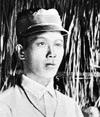- Aguinaldo, Emilio
-
died Feb. 6, 1964, ManilaPhilippine independence leader.He was born of Chinese and Tagalog parentage and was educated at the University of Santo Tomás, Manila. He became a leader of the Katipunan, a revolutionary society that fought the Spanish. Philippine independence was declared in 1898, and Aguinaldo became president, but within months Spain signed a treaty ceding the islands to the U.S. Aguinaldo fought U.S. forces until he was captured in 1901. After taking an oath of allegiance to the U.S., he was induced to retire from public life. He collaborated with the Japanese during World War II. After the war he was briefly imprisoned; released by presidential amnesty, he was vindicated by his appointment to the Council of State in 1950. In his later years he promoted nationalism, democracy, and improvement of relations between the U.S. and the Philippines.
 Emilio Aguinaldo.Brown Brothers
Emilio Aguinaldo.Brown Brothers* * *
▪ president of Philippinesborn March 23, 1869, near Cavite, Luzon, Phil.died Feb. 6, 1964, ManilaFilipino leader who fought first against Spain and later against the United States for the independence of the Philippines.Born of Chinese and Tagalog parentage, he completed his education at the University of Santo Tomás, Manila. In August 1896 he was mayor of Cavite Viejo and was the local leader of the Katipunan, a revolutionary society that fought bitterly and successfully against the Spanish. In December 1897 he signed an agreement called the Pact of Biac-na-Bató with the Spanish governor general. He agreed to leave the Philippines and to remain permanently in exile on condition of a substantial financial reward from Spain coupled with the promise of liberal reforms. While in Hong Kong and Singapore he made arrangements with representatives of the American consulates and of Commo. George Dewey to return to the Philippines to assist the United States in the war against Spain.Aguinaldo returned to the Philippines May 19, 1898, and announced renewal of the struggle with Spain. The Filipinos, who declared their independence of Spain on June 12, 1898, proclaimed a provisional republic, of which Aguinaldo was to become president; and in September a revolutionary assembly met and ratified Filipino independence. However, the Philippines, along with Puerto Rico and Guam, were ceded by Spain to the United States by the Treaty of Paris, Dec. 10, 1898.Relations between the Americans and the Filipinos were unfriendly and grew steadily worse. On Jan. 23, 1899, the Malolos Constitution, by virtue of which the Philippines was declared a republic and which had been approved by the assembly and by Aguinaldo, was proclaimed. Aguinaldo, who had been president of the provisional government, was elected president.On the night of February 4 the inevitable conflict between the Americans and Filipinos surrounding Manila was precipitated. Morning found the Filipinos, who had fought bravely, even recklessly, defeated at all points. While the fighting was in progress, Aguinaldo issued a proclamation of war against the United States, which immediately sent reinforcements to the Philippines. The Filipino government fled northward. In November 1899 the Filipinos resorted to guerrilla warfare, with all its devastating features.After three years of costly fighting the insurrection was finally brought to an end when, in a daring operation led by Gen. Frederick Funston, General Aguinaldo was captured in his secret headquarters at Palanan in northern Luzon on March 23, 1901. Aguinaldo took an oath of allegiance to the United States, was granted a pension from the U.S. government, and retired to private life.In 1935 when the commonwealth government of the Philippines was established in preparation for independence, Aguinaldo ran for president but was decisively beaten. He returned to private life until the Japanese invaded the Philippines in 1941. The Japanese used Aguinaldo as an anti-American tool. They caused him to make speeches, to sign articles, and to address a radio appeal to Gen. Douglas MacArthur on Corregidor to surrender in order to spare the flower of Filipino youth.When the Americans returned, Aguinaldo was arrested and, together with others accused of collaboration with the Japanese, was held for some months in Bilibid Prison until released by presidential amnesty. As a token vindication of his honour, he was appointed by President Elpidio Quirino as a member of the Council of State in 1950. In the later years of his life, he devoted his major attention to veterans' affairs, the promotion of nationalism and democracy in the Philippines, and the improvement of relations between the Philippines and the United States.* * *
Universalium. 2010.
